Posted on 1/31/2018
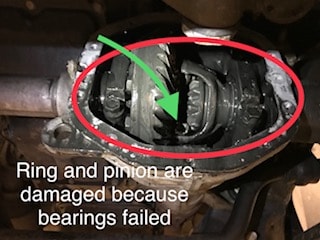
Noise is a classic sign of a bad Wheel Bearing or Wheel Hub Bearing. Here are some indicators of a worn wheel hub bearing or other wheel-end damage: • Snapping, clicking or popping. When you are turning you may hear this noise when turning a sharp corner. What this might be is a worn or damaged outer CV-joint, but it could be an excessive bearing endplay, which means it could be inadequate clamping due to wear. • Grinding when the vehicle is in motion. So, when you hear this, in the wheel-end system. Means it is mechanical damage. When turning or there is a shift in the load the noise is usually louder. • Knocking or clunking. This is not necessarily associated with bearing, but could be excessive play in CV-joints or U-joints, or by excessive backlash in the differential gears. When you are shifting from changing directions, going forward to reverse or transitioning from accelerating to coasting ... read more
Posted on 1/23/2018
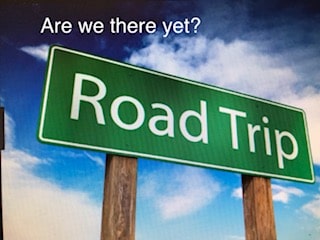
1. Stock your sleep time: Get at least seven hours of sleep for two consecutive nights before the road trip to build up your energy reserves. “Also, try to avoid driving between 1 and 3 p.m., when the body’s temperature is lower and people are naturally drowsy. 2. Fuel up: Good food for you, not the car. Carrying along a variety of vitamin-packed, healthy foods will allow you to get by on smaller snacks throughout the long drive, while skipping the fast-food stops. One blogger says almonds and carrots, two of my favorite (because you have to chew a lot!!) 3. Stay hydrated: Keep the water supply well-stocked for maximum energy. (Although frequent stops will need to happen—read on) 4. Plan your stops: One of the most crucial tips for long road trips is to get out of your car and stretch your legs every two hours or so, our experts suggest. 5. Chew gum: The repetitive process increas ... read more
Posted on 1/22/2018
.jpg)
A– It’s All There in the Manual: There are general rules of thumb for basic preventive maintenance, but the best place to start is by actually reading the owner’s manual for your vehicle’s make and model. A 1982 Honda Accord has different needs than a 2018 Honda, and they both differ from a 30-year-old Jeep. B – At Your Service: If you want to keep your car in the best possible shape, get Health Assessments done, we do them when we do Oil Changes. It is never profitable skipping your regular maintenance items. Catching a small problem before it becomes a large problem costing hundreds to sometimes thousands of dollars(engine). Every car needs regular service – it’s the easiest and best way to keep your car’s health up. Again, the recommended service intervals, such as oil changes and drive belt checks, will be in the user manual. C &ndash ... read more
Posted on 1/18/2018
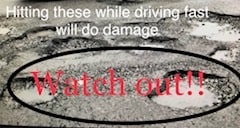
"When should I get a wheel alignment?" If you are looking for a shop near me who can help, look no further. Have you noticed the potholes, which seem to grow even larger after the a thaw and freeze? Three common issues that potholes may cause for your car: Tire Damage: I popped two tires by hitting the pothole just right, ugggg. Or, which maybe worse is that it takes a chunk out of your tire, which is very dangerous at high speeds as the tire could pop then. Alignment: Over time continually hitting potholes, can mess up with the alignment of your car. Have you been pulling to the left or the right? Bearings: If you hear a grinding noise while turning, your bearings maybe damaged. A wheel bearing is crucial for the proper function of the hub, tire and wheel assemblies to work together. #alignment #bearings #Tires #shopnearme
Posted on 1/9/2018
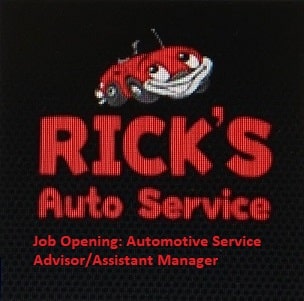
Automotive Service Advisor/Assistant Manager Full-time job Automotive Service Advisor-No Evenings or Weekends $35,000-$60,000 Excellent pay for the right individual-Rick’s Auto Service Base Pay Plus Bonus(depending on experience) We are an Independent, Family-Owned Auto Repair Shop in Mishawaka, Indiana looking for an Enthusiastic and Great Service ... read more
Posted on 1/8/2018
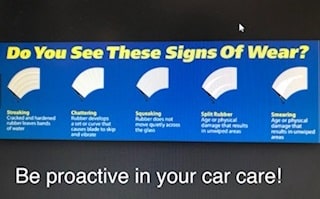
Depending on the following your Wiper Blades should be replaced every 6 months to a year. Remember some factors that may cause your Wiper Blades to deteriorate are as follows: Intense Sun as in Florida the ultraviolet light and ozone deterioration. Oil, when you use car wax and exhaust that can deteriorate the rubber in the wiper blades. Also, in everyday driving Sand, mud and dust carried in the wind can wreak havoc with your Wiper Blades also salt water and acid rain are two culprits. When checking your Wiper Blades here are some things to look at: Broken frame – detachment of frame arms at joints or connection points. Metal Corrosion – especially at joints and claws. Visible cracks, tears, and missing pieces in the rubber squeegee’s edge. Flex rubber squeegee back and forth to see if it is still flexible. Aged squeegees will have difficulty conforming to the shape of your windshield and create streaks. Check squeegee wiping edge for ... read more
Posted on 1/2/2018
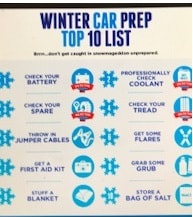
Slow down. Even if you have all-wheel drive, reduce your speed about 10 miles per hour below the speed limit. Beware of black ice. It’s nearly impossible to see this crystal-clear glaze, but you can spot it when your headlights reflect off the road at night. It tends to form on bridges, which trap the cold; in the shadows of tall buildings, where the sun can't hit it; and at intersections, due to drains. That's why, in bad weather, you should slow down a couple of hundred feet before stop signs and lights. Avoid tailgating. On the highway, leave about 100 yards (about the length of a football field) between you and the car ahead of you to give you plenty of room to stop in case that person brakes suddenly. Don’t brake during a turn. To avoid a spin-out, gradually start turning the steering wheel and feathering the brakes lightly before the curve. Then coast through the turn w ... read more